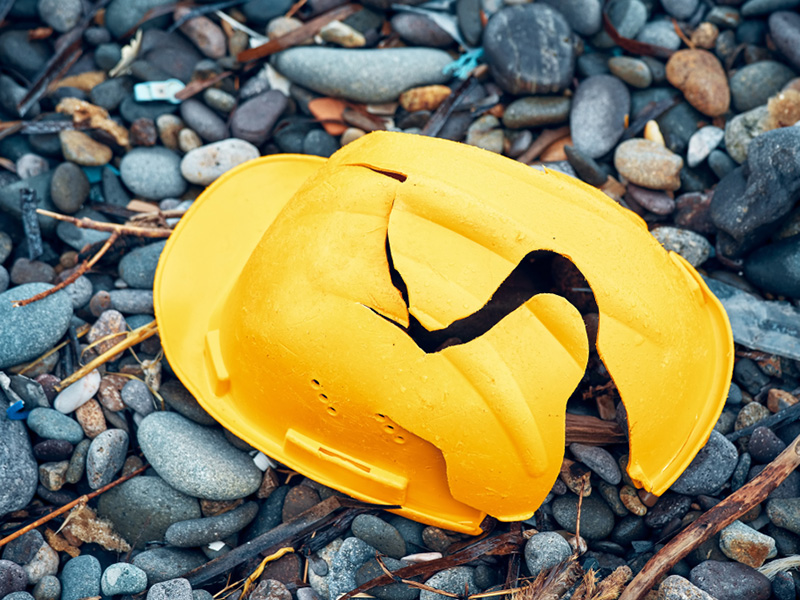As Kevin Bentson left a mine site in Chetwynd, the dump truck he was driving was leaking coal onto the road. So following a supervisor’s instructions, he climbed the ladder to the truck’s box to see if he could close it properly.
As he swung a leg up over the top edge, he caught a heel and fell more than two metres to the ground. He landed on his back and hit his head hard enough that he was knocked unconscious.
The injury happened Oct. 15, 2019. A year and a half later, Bentson is frustrated with the Workers Compensation Board, or WorkSafeBC, the provincial body whose mandate includes supporting the rehabilitation of people injured at work.
“I’m still in a crazy amount of pain,” Bentson said.
While he feels he needs more time and treatment to get better, which he says his doctor believes as well, Bentson says WCB is pushing him to go back to work before he’s ready.
“They just want to feed you drugs and get you back to work, but that creates more problems,” he said.
When he wanted to retrain as a heavy equipment operator, a job he believed he could do more easily while still recovering from a back injury, WCB resisted, he said.
“It didn’t feel like they were on my side,” he said. “It felt like they were just an insurance company on the side of the employer and wanted to get me out the door as quickly as possible and back into the work field.”
Complaints like Bentson’s about WCB are common, a fact that’s well known to the provincial government.
And yet a new report from the BC Federation of Labour finds the province has delayed making the needed changes.

In April 2019, the province appointed a retired labour lawyer, Janet Patterson, to review WCB and recommend changes to make the system more worker-centred.
Her 517-page report, delivered to the government in October 2019 and released to the public last August, was based on a public engagement process that included hearings in 14 communities and more than 70 written submissions from unions, employers, business associations and other stakeholders.
The report includes 102 recommendations, many of which require changes to provincial laws and WorkSafeBC policy. Overall, they speak to a need for a change of culture that returns the agency to a focus on helping injured workers and treating them with respect and dignity.
Patterson found the system works well for workers with simple injuries who follow a predictable path to recovery. But it fails many others.
“The government has known for a long time the workers’ compensation program has been broken in terms of how it treats workers in many cases,” said Laird Cronk, the president of the BC Federation of Labour.
The government appointed Patterson because it already knew there was a problem, he said, pointing out that the provincial ombudsperson’s office handles some 2,000 complaints a year related to WCB. “The government wasn’t just making it up that there was a problem with the system.”
Patterson’s report, particularly its 47-page addendum with powerful firsthand stories from injured workers, adds to the understanding of the problem and provides a road map forward, Cronk said.
And yet the government appears to be stalled.
“They haven’t done anything with it,” Cronk said. “That’s frustrating to me and that’s frustrating to the worker community.... It’s time for them to get on with it. It’s time for them to fix the system.”
The federation today released its own report — "Workers Deserve Better: How We Can Build the Workers’ Compensation System that Injured Workers Need" — calling for action.
The 20-page report by Kevin Love, a lawyer with the Community Legal Assistance Society, distills the Patterson report, highlights its key recommendations and points the way forward.
“Everyone involved in managing the system — the government, the WCB and the board of directors — must commit to implementing the recommendations in the Patterson report,” Love concluded. “As part of the consultations leading to the Patterson report, workers came forward to tell very personal and very difficult stories. These voices must be honoured with action to improve the system for all workers in British Columbia.”
In an interview, Love said the government has made some needed changes to the system since coming to office, but it needs to act on Patterson’s report as well.
“Right now, the system is failing too many workers, so we think we need to implement the Patterson report,” he said. “There definitely appears to be a lack of urgency and it’s important to note that every day that goes by it’s another worker who isn’t getting what they need from the system.”
The WCB system was set up as a compromise. In exchange for giving up the right to sue their employer when they are injured on the job, workers are provided with treatment for their injuries and financial compensation to make up for part of their lost wages.
Over the decades, the employer-funded WCB has gotten away from its original mandate, Love said.
“The system’s being run too much like a private insurance company where the goal is to minimize cost and get workers off benefits as quickly and as cheaply as possible,” he said. “The system shouldn’t be run like a private insurance company. It should fulfil its fundamental purpose, which is to help injured workers and to provide quality medical care and vocational rehabilitation and important financial security for injured workers.”
Labour Minister Harry Bains said that the government has already made some changes to WCB and that more are coming, but it takes time to do it right.
“We continue to speak to the stakeholders, all the employers and the workers and their representatives,” Bains said.
The government is mindful about adding costs for employers, especially as the provincial economy continues to recover from the COVID-19 pandemic, he said. At the same time, Bains said, it’s important to have a system in place that promotes workers’ health and safety and helps them when they are injured.
“It’s important to make sure the workers have a system that can support them when they need it, with their health and safety, at the same time when they’re navigating their claims that they are supported,” he said.
That’s little assurance to workers like Bentson, who says that based on his experience, people seeking help from WCB need to be prepared to fight for what they need.
“They didn’t have my back at all until I forced a review and made a huge complaint,” he said. “It was horrible. At one point I was looking at getting a lawyer because everything was a ‘no.’ Everything was denied.”
He recommended that people going through the process try to go in with somebody else who can advocate for them, because WCB isn’t there to help.
“They’re not for the people. They’re not for the worker. They’re for the employer and for themselves,” he says.
“You need all the backup you can get, because you are alone. They’re not for you.” ![]()
Read more: Rights + Justice, Labour + Industry, BC Politics
















Tyee Commenting Guidelines
Comments that violate guidelines risk being deleted, and violations may result in a temporary or permanent user ban. Maintain the spirit of good conversation to stay in the discussion.
*Please note The Tyee is not a forum for spreading misinformation about COVID-19, denying its existence or minimizing its risk to public health.
Do:
Do not: